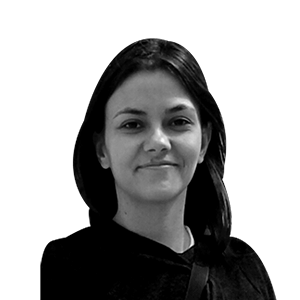Syrian refugees from Lesbos in Rome: "Pope Francis gave us another chance"
Nour Essa, who traveled on the papal plane to Italy, emotionally recalls the figure of the Pontiff.


RomeWhen Nour Essa landed with her family in Rome on the same plane that was carrying Pope Francis back from his trip to the Greek island of Lesbos in April 2016 She didn't speak a word of Italian. "We had escaped from Damascus in 2015 because my husband, Hassan, had been called up to join the army. We didn't want to go to war; we had no other choice," she explains now from the Italian capital. She is still affected by the Pope's death.
Essa, now 39 and a microbiologist, works at the Infant Jesus, the Vatican-owned children's hospital. It's been almost ten years since she left her country with only a change of clothes, diapers, and some milk for her 2-year-old son, but she still remembers the anguish of those days. "I was studying for my doctorate in Montpellier, France, thanks to a scholarship, and when I returned to Syria for the holidays, the war broke out and I couldn't leave," she recalls in ARA.
Four years later, they sold their house to pay a smuggler who took them from Syria to Turkey, crossing territory controlled by Daeix [Islamic State], and then another who managed to reach Greece. Carrying their son, she and her husband walked through the desert, traveled for hours in several rickety vehicles, and risked their lives on a small boat before being intercepted by the coastguard sent to Lesbos, the island that became a symbol of the migration drama.
A month later, the Pope visited the refugee camp where thousands of people were trapped after the agreement signed between Türkiye and the European Union to prevent the passage of migrants across European borders. "You are not alone! Do not lose hope!" cried the Pontiff, sadly denouncing the "greatest humanitarian catastrophe since the Second World War." But it wasn't just words.
In an unprecedented gesture, Francis brought aboard the plane 12 refugees who had been selected by the Community of Sant'Egidio, the Catholic association that works with the Vatican to promote peace. Three Syrian families, including Nour's, to whom the Pope gave the opportunity to start a new life far from bombs and misery. The charity then managed to bring more than 300 refugees from Greece to Italy and 150 on another papal trip to Cyprus in 2021.
"We were lucky because the same day we arrived in Lesbos at six in the morning, they gave us our papers, while the people who had already arrived [under the agreement between the EU and Turkey] were repatriated," she explains. She still remembers the Pope's caresses in the small Riyadh on board the plane shortly before the Pontiff crossed the curtains to answer questions from the traveling journalists.
"He was very modest and approachable."
"The first thing I thought upon meeting him was that he didn't look like a leader of the Church. He was very modest, approachable, and always smiling," she recalls. "His gesture opened the door for so many other refugees from Libya, Syria, Afghanistan, and so on to reach Europe through humanitarian corridors without paying traffickers or risking death. How many lives have been saved thanks to him and his insistence on helping refugees and migrants," she explains, unable to contain her voice. During those years, the Pontiff met with the families several times. "He was always concerned about all of us."
For the first few months, Nour's family lived in foster care with the Community of Sant'Egidio. They began studying Italian, and soon she and her husband, who worked as a civil servant in Damascus, enrolled in university to have their degrees recognized. A year later, Nour found work at the Vatican hospital and continued studying for a master's degree in molecular biology. He is now specializing in medical microbiology, while Hassan works in a studio as an architect after spending a few years behind a shop counter. "Our problems are now like those of any Italian: work, shopping, making ends meet..."
The death of the Pontiff was a hard blow for this family, who now lives on the outskirts of Rome in a humble apartment. "The pain of his death has been doubled for our family because with his gesture, the Pope gave us a new opportunity," they say, while acknowledging that they do not plan to return to Syria. "The regime has fallen, but the situation is not stable. I would like to return in the future so that our son can learn about his origins, but for us it would be difficult. After all, our life is here."
